Finding Truth Matters, home > articles > apologetics > The Ethics of Embryonic Stem Cell Research

The Ethics of Embryonic Stem Cell Research
by Dr. Andrew Corbett originally written 28th October 2007 from Legana, Tasmania; updated 20th September 2025, Melbourne Victoria.
One of the most controversial debates raging at the moment is about the ethics of embryonic stem cell research. This debate has been curiously pitched as Science versus Religion. Sadly, this unfairly simplistic assessment of the debate has meant that any argument put forward by any Christian from the field of medical-science is instantly dismissed as merely “religious” arguments! Therefore what this argument is supposed to be about is often lost in the false idea that this is about religion versus science.
IS THIS A DEBATE BETWEEN RELIGION & SCIENCE?
No. It’s a debate between ideologies (ideas that shape our opinions about the world around us). It’s not even really a debate between ‘progressive’ science and ‘conservative’ science (as we’ll see soon). While it’s not really a battle between science and religion, it is a very serious ethical dilemma that can possibly be presented as-
Which is more ethical?
* OPTION 1: To destroy unwanted human embryos and not use these doomed human ‘tissue cells’ that could potentially save or dramatically improve the quality of a suffering person’s life?
Or…
* OPTION 2: To allow medical researchers to examine the potential health benefits latent within unwanted human embryos (left-over from IVF).
This is generally how the debate is expressed. Because those who are ‘religious’ generally regard human life as unique and a gift from God, they regard destroying the life of a human embryo as not only morally wrong but also ethically wrong. This contrasts with the approach by naturalists (atheists) who regard life as a chemical equation and the result of random chaotic evolutionary events.
WHAT ARE STEM CELLS?
We all have stem cells. They are essentially those parts of the human body that are designed to make running repairs. When you cut your finger, stem cells get to work to repair your broken skin. But, not all parts of our bodies have these stem (building/repairing) cells. When you think of those parts of our bodies that can repair themselves: skin, bone, muscle, it’s because of stem cells. But what medical scientists suspect is that these stem cells perform an ‘additional’ function in human embryos. It is believed that these embryonic stem cells have the capacity to become the building blocks of virtually any body part- including those parts that in an adult that don’t ordinarily have stem (building/repairing) cells. It is believed that it could therefore be possible to ‘clone’ specific body parts- like spinal cords or brain cells – from these embryonic stem cells and implant in them into an adult who has irreparable body damage. Anyone who has known someone suffering with Multiple Sclerosis (MS) or Parkinson’s Disease has despaired not only at the agony these people have to endure but at the thought that their incurable predicament can only deteriorate. It would be cynical to think that Medical Researchers are only motivated to discover a cure or better treatment for these incurable conditions for purely commercial reasons. There is an obvious desire to relieve human suffering and improve the quality of life for those who unfortunately lost the genetic lottery and suffer as a result. And this motivation reinforces the incredible and immeasurable value of an individual human life. Which makes the use of human embryos ironic.
SOURCES OF STEM CELLS
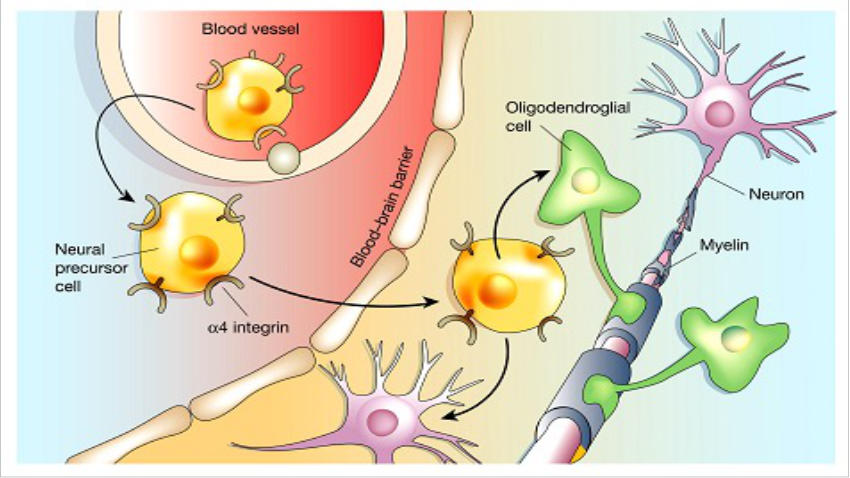
THE USE OF HUMAN EMBRYOS
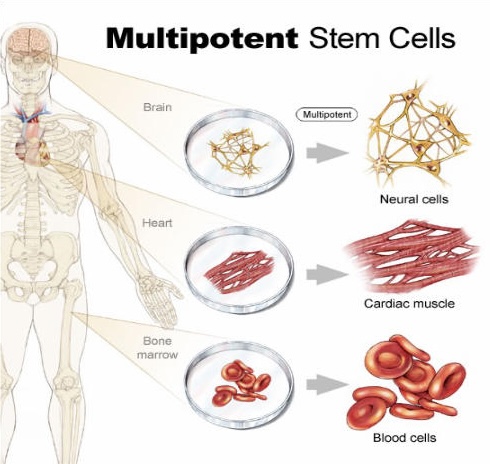
When we talk about removing these invaluable and potentially life-saving stem cells from an embryo two questions arise. Firstly, can the embryo survive if some of its stem cells are removed (“harvested”)? Secondly, assuming that embryo death results from such stem cell harvesting, in what way is this not to be regarded as the taking of a human life and therefore to be considered in utero infanticide?
As we ponder these two important questions, let’s visually consider what we mean by an embryo-
| VISUAL | AGE / LENGTH | DEVELOPMENTAL STAGE |
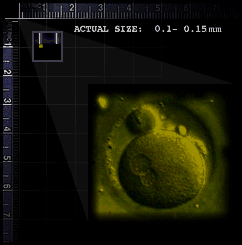 |
Day 1 0.1mm |
“Zygote” |
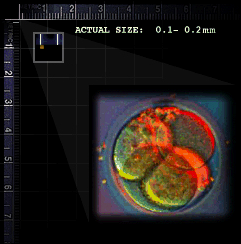 |
Day 2 0.2mm |
“Morula” |
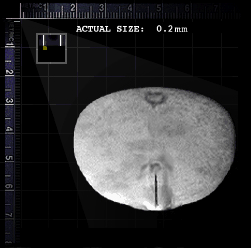 |
Day 13 0.2mm |
Placenta formation |
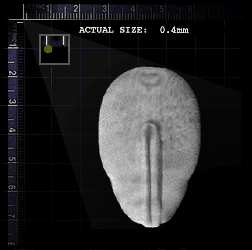 |
Day 16 0.4mm |
Neurulation |
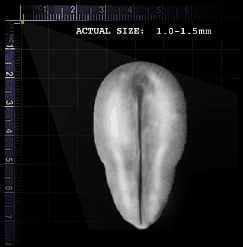 |
Day 18 1.0mm |
Implantation |
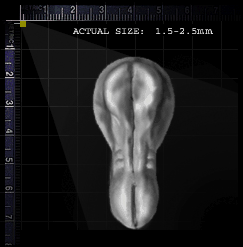 |
Day 20
|
Somites appear |
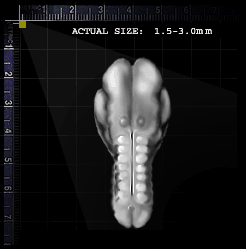 |
Day 22 | Neural folds and heart folds develop |
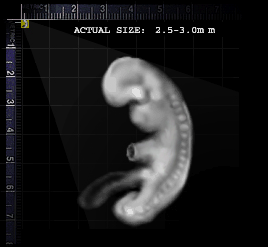 |
Day 24 3.0mm |
Initial pharyngeal arches appear Heart is now beating. Central nervous system is now functioning |
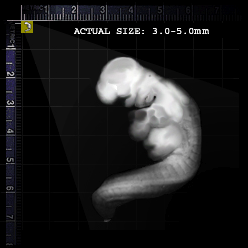 |
Day 28 5.0mm |
Upper limb buds appear Eyes and ears appear. The brain and spinal cord are the largest tissues of the embryo at this stage |
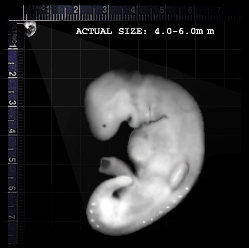 |
Day 30 5.0mm |
Pharyngeal arches develop Face and neck begin to form. Blood system now evident |
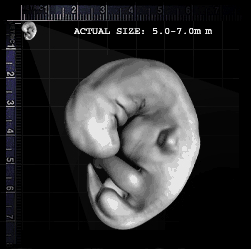 |
Day 35 7.0mm |
Esophagus forms |
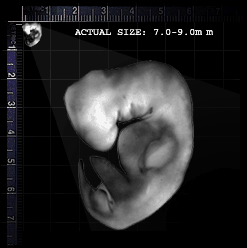 |
Day 38 7.00mm |
Cerebral hemisphere forms Eyes begin to form |
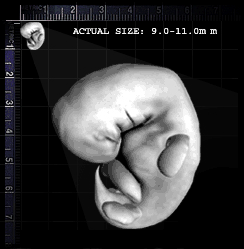 |
Day 40 11.0mm |
The Hindbrain formed (regulates the heart, breathing, and muscle movement) Digits (fingers and toes) appear |
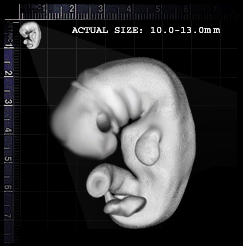 |
Day 43 13.0mm |
Four chambered heart now formed Facial muscles now developing. Ears are now recognizable. Heart functioning. |
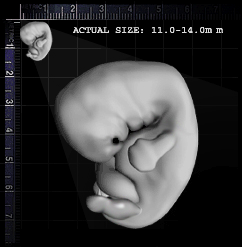 |
Day 46 14.0mm |
Eyes pigmented Nipples appear. Hand plates formed. Kidneys now producing urine |
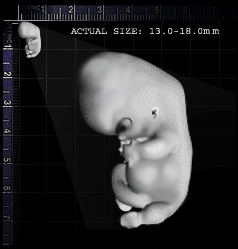 |
Day 50 18.0mm |
First detectable brain waves The brain is now functioning. Ears now functioning to provide a sense of balance |
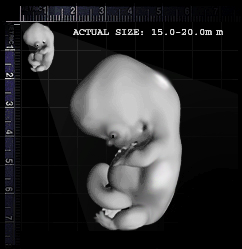 |
Day 52 20.0mm |
Spontaneous movements Nose formed, nasal openings evident. Genitals formed (testes or ovaries). Toes formed |
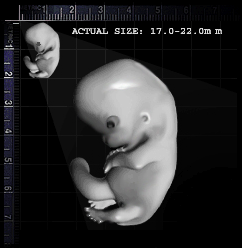 |
Day 53 22.0mm |
Intestines recede from the umbilical cord into the embryo Eyes now developed |
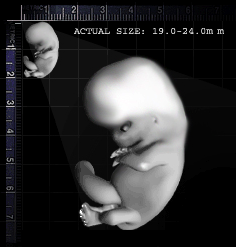 |
Day 55 24.0mm |
Cartilage forming into bones. Brain can now move muscles. |
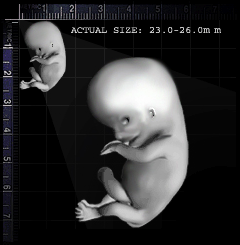 |
Day 58 26.0mm |
Head is erect and rounded. External ears are completely developed. The eyes are closed, but the retina of the eye is fully pigmented. The eyelids begin to unite and are only half closed. Taste buds begin to form on the surface of the tongue. The primary teeth are at cap stage. Bones of the palate begin to fuse. |
|
End of the embryo stage. (Table 1) |
||
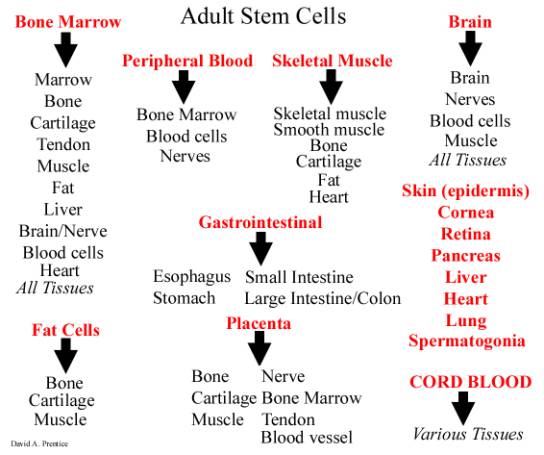
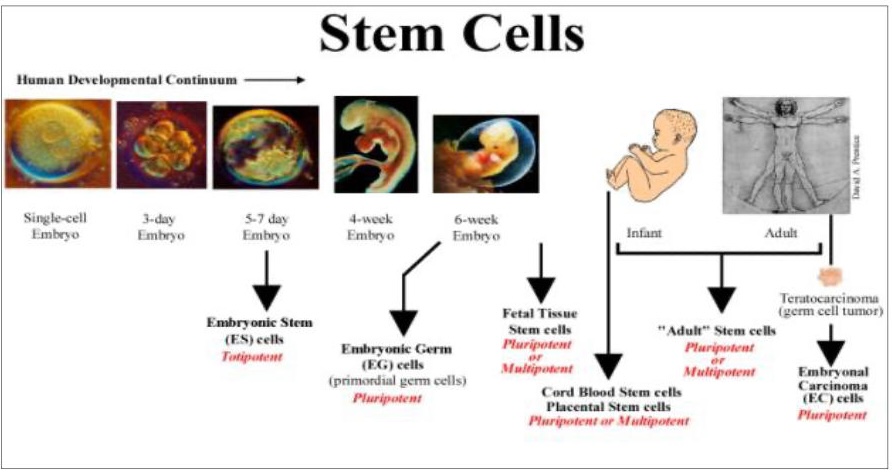
IS A HUMAN EMBRYO HUMAN?
I have heard (November 30th 2006) a member of the Tasmanian Upper House, who is unfortunately suffering from Parkinson’s Disease, lend his support to the quest to legalise Embryonic Stem Cell research. His argument was that the killing of an embryo was reasonable and morally justifiable since a human embryo “is not a human being”. Therefore, while he stated his opposition to murder and even seriously questioned the morality of abortion-on-demand, he regarded the harvesting of stem cells from human embryos as perfectly legitimate (since according to his reasoning, a human embryo is not human).
The claim that a human embryo is not a human being is reasoned in several ways. To be a human being, it is claimed that you must-
- Think and reason independently.
- Exist independently.
- Have all the necessary internal organs to digest, process, and convert nutrients.
But this is an unreasonable criteria. Some children are actually born with the majority of their brain missing (anencephalic), yet no-one would claim that they are not “human”. Other children are born with hydrocephalus, which is a condition that severely compresses the brain due to a major build up of fluid in the head.
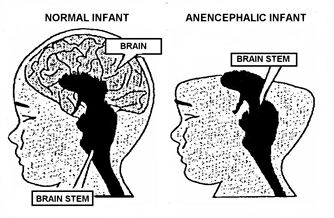
The argument that an embryo is not yet human because it could not independently exist apart from its host (its mother) is quite unreasonable because it could be argued that any newborn child is similarly non-independent and totally reliant upon others for its survival. This can also be argued for the terminally ill and disabled who become dependent upon others for their survival. It would be unreasonable to claim that a new-born baby or an invalid is not human.
Thirdly, some people are born without all the necessary organs that others are blessed with. Some children are even born with these organs in the wrong places! Yet again it would be absurd to claim that these people were not human. The Washington Post recently reported the story of a baby born with its heart outside of its body-
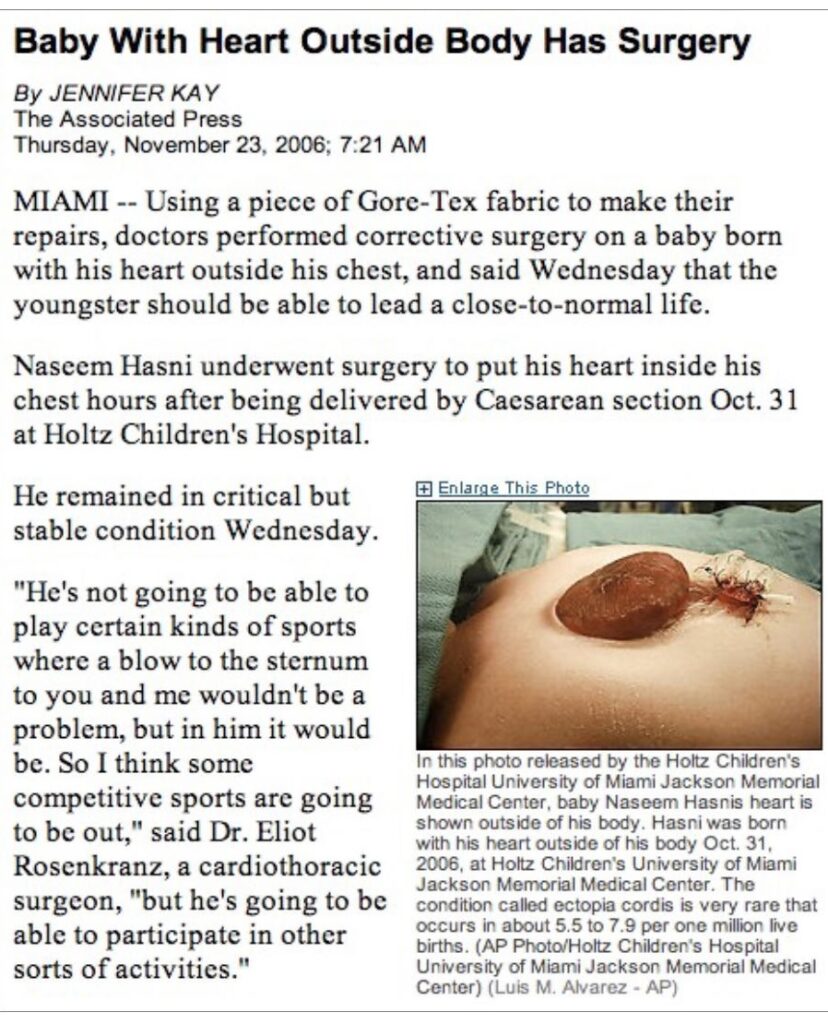
Other people are unfortunate enough to either be born with or develop conditions that deprive them of genitals, renal function, or taste. Yet with artificial assistance these people function relatively well.
Curiously, the ABC interviewer who questioned the Tasmanian MLC asked him whether his incurable disease had affected his judgment in the matter of Embryonic Stem Cell research. He said that it might have but that it was important to leave religion, ethics, and morality out of this debate and concentrate “only the science”. I would have liked the ABC journalist, Tim Cox, to have asked him “Why?” but I suspect the interviewer’s own confessed atheism hindered him from seeing why this might have been a problem. The MLC offered no reasons as to why ethics and morality should be left out of this debate, and I find it amazing that so many people simply accept such a criteria for life and death decision-making.
The interviewer asked the MLC about Australian Senator, Guy Barnett, and his vigorous campaign to thwart the Therapeutic Cloning Bill (Embryonic Stem Cell Research). While he expressed genuine admiration for Senator Barnett, he said that his arguments were not valid and would hinder those who could benefit from the fruit of this research- like those suffering from diabetes. Ironically, Senator Barnett (perhaps unknown to the MLC) suffers from this incurable disease. In other words, Guy Barnett is amply qualified to speak about these issues because they may directly affect him. The MLC criticised Senator Barnett’s argument that Embryonic Stem Cell research held out false hope to sufferers of incurable diseases and conditions. I agree with the MLC that this argument is a very weak one against approving the Therapeutic Cloning Bill (because medical-scientists won’t know what hope there is until they begin experimenting). This is despite the fact that Senator Barnett is pointing out the present reality of this type of research that the only advances that have come stem cell experiments have been from adult stem cell harvesting (where no embryos are used). But ultimately this is not the point and perhaps Senator Barnett should focus on the morality of cloning human embryos rather than the scientific benefits or otherwise.
DOES AN EMBRYO HAVE A SOUL?
Some Christians who support embryonic stem cell harvesting have appeased their consciences by believing that an embryo does not have a soul. They base this belief partly on the following reasoning-
- 3 out of 4 embryos do not survive – God would not willingly waste a ‘soul’ on such embryos otherwise heaven would become overpopulated.
- Since God endorses the use of chemical contraception (“the Pill”) which increases the risk of embryo miscarriage, God would not have invested a soul in these embryos that He knew would die before birth.
- The Biblical genealogies never list the life from a failed pregnancy as being a person in the eyes of God.
- Does God waste souls on unwanted human embryos?
But the Bible seems to indicate that humanity (a human soul) is created at the point of conception. The Bible stresses conception in describing the impending birth of certain babies-
Now Adam knew Eve his wife, and she conceived and bore Cain, saying, “I have gotten a man with the help of the LORD.”
Genesis 4:1
But as he considered these things, behold, an angel of the Lord appeared to him in a dream, saying, “Joseph, son of David, do not fear to take Mary as your wife, for that which is conceived in her is from the Holy Spirit.”
Matthew 1:20
To describe the death of human as a “waste” is not necessarily the perspective of God (note Psalm 116:15 – “Precious in the sight of the LORD is the death of his saints”). If miscarried human embryos are soul-invested humans are they in heaven without ever having put their faith in Jesus Christ? First Corinthians 7 alludes to the possible interpretation that children who have not yet reached the age of understanding are “sanctified” or “made clean” by the saving faith of their parents, if they are not, Scripture says, they would “be left out”.
The unbelieving husband shares to an extent in the holiness of his wife, and the unbelieving wife is likewise touched by the holiness of her husband. Otherwise, your children would be left out; as it is, they also are included in the spiritual purposes of God.
First Corinthians 7:14 THE MESSAGE
Therefore, it is already within the scope of Scripture that miscarried embryos may well be sanctified by the faith of their parents. My wife and I have suffered the loss of two in utero babies. I am personally confident that, like King David, I will one day see my unborn children in heaven.
But now he is dead. Why should I fast? Can I bring him back again? I shall go to him, but he will not return to me.”
Second Samuel 12:23
Does this present a heavenly “over-population” problem for God if embryos have a soul and are granted admission to heaven? This assumes that heaven is constrained by the same physical constraints as our world. But this is a false assumption and is not taught in Scripture.
Does God endorse the destruction of unwanted human embryos through chemical contraception?
The assumption behind this objection to embryos having souls is that God actually does endorse the deliberate termination of human life within the womb through chemical contraception. This objection would not have been raised before the 1960s since most churches actually did condemn the use of chemical contraception. The Roman Catholic Church still does. On Christian Research Institute website they note-
Wouldn’t your position mean that some forms of artificial birth control result in homicide? Yes. For example, forms of birth control that result in the death of the conceptus, such as the IUD and the “morning-after” pill (RU-486), would logically entail homicide if the pro-life position is correct. However, not every form of birth control results in the death of the conceptus. For example, the condom, diaphragm, some forms of the Pill, spermicides, and sterilization would not logically entail homicide if the pro-life position is correct, for they merely prevent conception.
This is why the pro-life advocate makes a distinction between contraception and birth control. Contraception literally means “to prevent conception.” Therefore, all contraception is a form of birth control, since it prevents birth. But not all forms of birth control are contraceptive, since some forms — such as the ones cited above — prevent birth by killing the conceptus after conception. Hence, the pro-life advocate as such finds no problem with contraception as a form of family planning.
If human embryos have a soul, why are miscarried human embryos are not listed in the Biblical genealogies?
This is a strange argument. Not only are human embryos not listed in any Biblical genealogy neither are many generations of people. Does this mean that since these people are not listed in the Biblical genealogies that they did not have souls? This would be absurd reasoning. For example, in Matthew 1 we have the genealogy of Christ divided into three groups of 14 generations. We know however from the Old Testament records that there were indeed many more generations of ancestors who are not mentioned in the genealogy of Christ in the Matthew 1 account.
THE BIBLICAL TEACHING ON THE CREATION OF A SOUL FROM CONCEPTION
The Psalmist, under the inspiration of the Holy Spirit, writes that he was conceived as a sinner (Psalm 51:5).
For I was born a sinner— yes, from the moment my mother conceived me.
Psalm 51:5 NLT
To write this verse off by saying that everything is in sin because of the Fall of Adam is a Platonic idea – not a Biblical one! To the Greek Philosopher, Plato, the physical realm was inherently evil – only the immaterial soul was free from evil. When Adam sinned, his sin was imputed to all mankind – not to all “creation”.
When Adam sinned, sin entered the entire human race [not all creation]. Adam’s sin brought death, so death spread to everyone, for everyone sinned.
Romans 5:12
Therefore, Romans 5:12 endorses the teaching of Psalm 51:5 that a zygote (the youngest form of a human embryo) has a soul capable of being corrupted by sin.
You watched me as I was being formed in utter seclusion, as I was woven together in the dark of the womb.
Psalm 139:15
Jeremiah 1:5 describes Jeremiah being “known” by God from the moment of conception in his mother’s womb. Some have responded to this powerful Scriptural support for an embryo having a soul by saying that God knew each of us before we were conceived. But there is no Scriptural support for this. It is actually a Mormon teaching (who teach the pre-existence of the soul prior to conception), but it is not a Christian teaching.
In James 2:26 it says that human life is only possible by the investing of a spirit/soul, without which there can be no human life-
For as the body apart from the spirit is dead, so also faith apart from works is dead.
James 2:26
WHY EMBRYONIC STEM CELL RESEARCH (INCORPORATING HUMAN CLONING) IS MORALLY INDEFENSIBLE
Despite Terry Martin MLC (Tasmania) demanding that “ethics and morality be left out of the argument” (which is tacit admission that what is proposed is known to be unethical and immoral) this is fundamentally a moral and ethical issue- not merely a scientific one. Medical Science may well discover how to use embryonic stem cells to improve the quality of life of someone suffering, but at what human cost? What if scientists discovered that all 21 year olds develop a revolutionary secretion from their pancreas that could save the life of millions if the pancreas, kidneys and liver were permanently removed from the 21 year old? This is of course an absurd scenario but I exaggerate to highlight the principle involved behind Embryonic Stem Cell research. That is, it is immoral to take a life to possibly preserve a life. Therefore, this is not a debate about the potential health benefits to be derived from cloning human embryos for the harvesting of their stem cells.
Nevertheless, this is still the main argument used by advocates of embryonic stem cell research. This is despite all of the therapeutic advances from stem cell research being derived from adult stem cells. This is countered by the argument- “We haven’t found any therapeutic benefits yet – in the same way that prior to 1969 we hadn’t landed a man on the moon! Allow us to continue to our research and eventually we will find benefits!” And they probably might eventually be able to – but this is an extremely inappropriate analogy. The ethical dilemmas associated with landing men on the moon involved the potential to injure or lose human life. This is contrasted with the ethical and moral dilemma associated with human embryonic stem cell research where loss of human life is necessary. It would be more appropriate to make such an analogy a 1:1 ethical dilemma by having any such rocket ship powered by the same source of therapeutic benefit from embryonic stem cells: human embryos – to make the analogy more apt. Further, the argument that researchers could one day derive benefit from embryonic stem cell research may well be proven true (even though early indications by researchers in other parts of the world have proven extremely disappointing and even disturbing), but this doesn’t get around the major contradiction that human life is created and destroyed or taken and destroyed to potentially benefit another human. This is utilitarianism (the end justifies the means) at its ugliest.
Secondly, I return to the two questions I raised near the start of this article: Is a human embryo, human? The arguments of “independence” given for defining humanity have been explored and found deficient. How then can we better and unequivocally define “humanness”? I believe the answer is simple: DNA. If a living organism has human DNA exclusively, it should be regarded as human. A human embryo has all the human DNA it will ever have. We know that “humanness” is not simply a chemical or biological equation: it is a matter of information and a metaphysical quality referred to as a soul. To claim that a human embryo is “just a collection of cells” is an emotional statement, not a scientific one! This is still the case even if medical researchers are “just” taking an unfertilised human egg and triggering its growth with foreign human cells so that potential embryonic stem cells are “cloned”! An embryo rapidly develops its commonly accepted “human” functions extremely early (note Table 1). A beating heart, an active brain, a renal system, and a neurological system are all in place and functioning during the embryonic stage of human development. To claim that an embryo is not yet human simply defies logic and the scientific data! Medical science researchers don’t dispute this. They generally appeal to the “So what?” argument, and argue that the benefits to be gained from experimentation on these “unwanted” and “cloned” embryos far outweighs any moral issues involved. I strongly disagree.
Thirdly, can an embryo survive the removal of its stem cells? No. Since it can be reasonably shown that a human embryo is a human, it deserves the dignity that is becoming to any human.
|
NEW AUSTRALIAN LAW
What has now been approved by the Federal Parliament of Australia following the Lockhart Report is that a human embryo can be created through cloning. This is done by harvesting ovum from a female, removing its nucleus and inserting the necessary DNA from human tissue of a stem cell recipient into its nucleus so that its stem cells can then be harvested. This procedure creates life to destroy it to potentially save another. This new Australian legislation will allow for the ovum of aborted unborn baby girls to be harvested to create human embryos for the purpose of harvesting stem cells. This means that an aborted unborn baby girl could in fact become a mother to an aborted human being!
HOPE
Adult stem cells, and stem cells from cord blood are already providing promising results in this arena of research. But like many medical breakthroughs, cures often come from unlikely places (like penicillin from moldy bread!). Yet it seems that all hope is being put in the morally indefensible procedure of cloning a human life then killing it to harvest its stem cells. It is bewilderingly sad that so many Australian politicians have been lulled into dismissing moral and ethical arguments against this practice and accepted that this is only about medical outcomes.
This is not a battle against science and religion! It is a scientific battle to discover effective cures that should be conducted ethically in a way that upholds the dignity of all who bear the image of our Creator inscribed in their own DNA.
© Dr Andrew Corbett, originally written 28th October 2007 from Legana, Tasmania; updated 20th September 2025, Melbourne Victoria. www.findingtruthmatters.org

(c) Finding Truth Matters. - Public Policy - Cultural Commentary - Ethics - Philosophical-Biblical-Theology
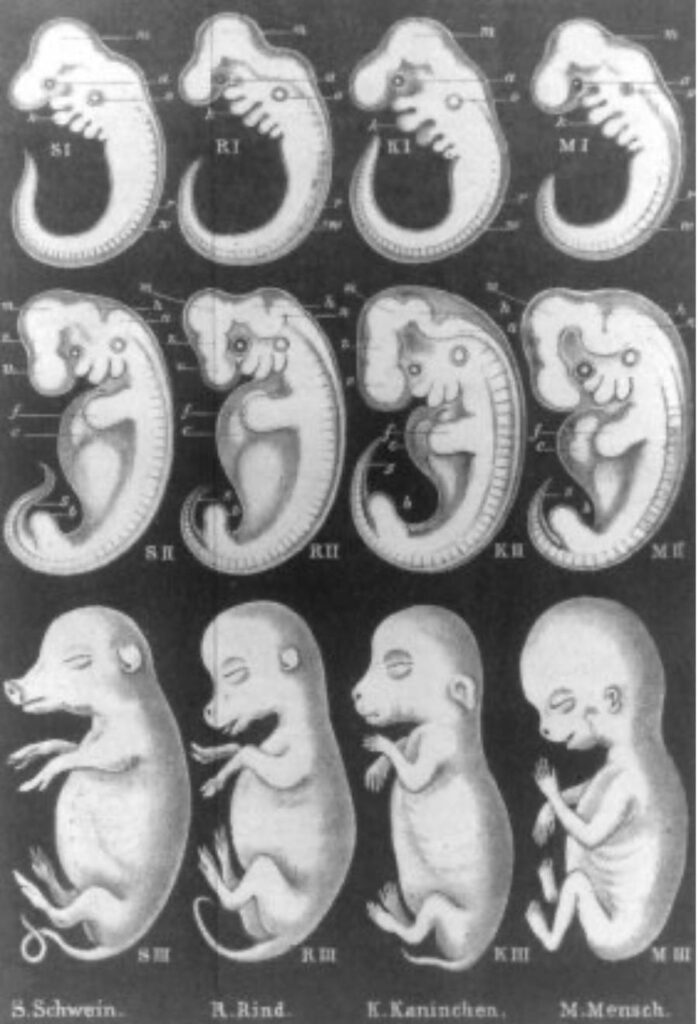
0 Comments